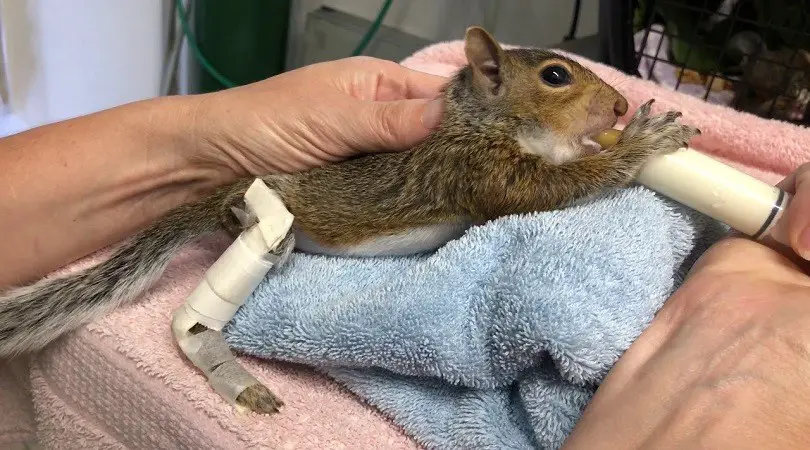Last Updated on January 6, 2025
The most common way to treat aspiration pneumonia in baby squirrels is with antibiotics. The specific antibiotic will be determined by your veterinarian based on the severity of the infection and the type of bacteria present. In some cases, hospitalization may be necessary so that the baby squirrel can receive IV fluids and close monitoring.
Treatment typically takes 7-10 days.
- If you think your baby squirrel has aspiration pneumonia, take it to the vet immediately
- The vet will likely give the squirrel a physical examination and may also order x-rays or other tests to confirm the diagnosis
- Aspiration pneumonia is treated with antibiotics, typically given through an IV
- The squirrel will also need supportive care, including plenty of rest and fluids
- With proper treatment, most baby squirrels recover from aspiration pneumonia within a few weeks
Baby squirrel nearly dies Aspiration Pneumonia sick baby squirrel aspirated click fed incorrectly
How Do I Stop My Baby Squirrel from Aspirating?
If your baby squirrel is aspirating, it means that they are breathing in liquid or food instead of air. This can be a very serious problem and you should take them to the vet immediately. If the aspiration is severe, they may need to be hospitalized.
There are a few things you can do to try to prevent aspiration in your baby squirrel. First, make sure that they are always upright when eating or drinking. You can prop them up with a pillow or towel if necessary.
Second, give them small meals often instead of large ones. This will help them avoid swallowing too much at once. Finally, make sure their food and water dishes are clean and free of debris.
What is the Treatment for Aspiration Pneumonia?
Aspiration pneumonia is a type of lung infection that occurs when liquids, food, or vomit are brought up from the stomach and then breathed in (inhaled). This can happen if you have trouble swallowing, are very sick to your stomach, or pass out.
When these substances are inhaled into the lungs, they can cause serious problems.
The small air sacs in the lungs (alveoli) can fill with fluid or pus, making it hard to breathe. Aspiration pneumonia is most likely to occur in people who have problems with their ability to swallow (these are called dysphagic disorders), but anyone can get it.
The symptoms of aspiration pneumonia vary depending on how much material was inhaled and what types of organisms are present.
In some cases, there may be no symptoms at all. But usually within a few hours after inhalation, you will develop:
– coughing
– wheezing
– chest pain
– fever
– rapid breathing
If you have any of these symptoms and think you may have aspirated something, see a doctor right away. Aspiration pneumonia is a serious condition and needs prompt treatment.
If it’s not treated quickly, it can lead to respiratory failure or even death.
How Do You Save a Sick Baby Squirrel?
The best thing you can do if you find a sick baby squirrel is to take it to a wildlife rehabilitation center as soon as possible. If you are unable to take the squirrel to a rehabber, there are some things you can do to care for it until you can get help.
First, make sure the squirrel is warm.
You can do this by placing it in a box with a soft cloth or towel. Put the box in a warm place, away from any drafts. You can also use a heating pad on low heat underneath the box (be sure to wrap the heating pad in a towel first).
Next, give the squirrel something to drink. You can use an eye dropper or syringe (without the needle) to give it some water or Pedialyte. Do not force anything down its throat – let it sip at its own pace.
If possible, offer the squirrel some food like unsalted peanuts, chopped fruits or vegetables, hard-boiled eggs, or insects like mealworms. Again, don’t force feed – let the squirrel eat on its own timeline.
If you have any questions or concerns about caring for a sick baby squirrel, please contact your local wildlife rehabilitation center for guidance.
Why is My Baby Squirrel Breathing Hard?
If your baby squirrel is breathing hard, it may be due to a number of factors. First, young animals generally have faster respiratory rates than adults. Secondly, if the weather is hot or humid, your squirrel may be working harder to regulate its body temperature.
Thirdly, if your squirrel is ill or injured, its respiration rate will increase in an effort to get more oxygen to its cells. If you are concerned about your baby squirrel’s respiration rate, take it to a veterinarian for an evaluation.

Credit: www.squirrelrefuge.org
Conclusion
If you find a baby squirrel that appears to have aspiration pneumonia, the first thing you should do is take it to a wildlife rehabilitation center. There, the staff will be able to properly assess the situation and provide the best course of treatment. If you are unable to take the squirrel to a rehabilitation center, there are some things you can do at home to help ease its symptoms.
First, make sure the squirrel has access to fresh water at all times. Next, give it small amounts of plain yogurt or cottage cheese mixed with honey. You can also offer it pieces of soft fruits and vegetables like bananas or cooked sweet potatoes.
Finally, make sure the area where the squirrel is staying is warm and free from drafts.








